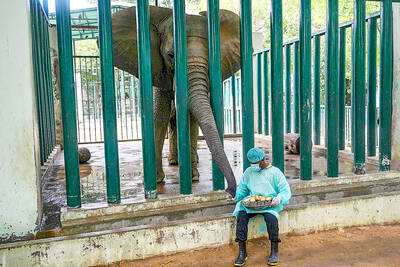The downfall of millionaire “Mr X,” long shielded by cash and contacts in Laos, has highlighted the role of the secretive communist country in showering pills across Southeast Asia.
Allegedly a key figure among gangs buying drugs from Myanmar’s methamphetamine labs, Laotian Xaysana Keophimpha — dubbed “Mr X” — is believed to have used his graft-riddled country to shuttle narcotics south.
The heavy-set 42-year-old was on Jan. 19 arrested by Thai police at Bangkok’s main airport en route to Laos where he lived freely, reveling in a lifestyle of celebrity parties and supercars.
He denies charges of drug possession and smuggling.
However, subsequent police operations have turned up several more men accused of running drugs through Laos, an opaque country whose role in the regional narcotics trade is gradually emerging.
They are the suspected intermediaries of the “Golden Triangle,” shifting pills, methamphetamine and heroin from the world’s second-largest drug producing zone to a regional market.
Among the accused is Xaysana’s friend Sisouk Daoheoung — a minor Laotian celebrity with a penchant for thoroughbred horses, and a shared devotion to fast cars and fancy holidays flaunted on social media.
If police are right, their ostentation in one of Asia’s poorest countries was funded by smuggling highly addictive caffeine-laced methamphetamine pills — better known as “yaba,” or crazy medicine — and crystal meth.
“From Xaysana’s phone and Facebook records it was clear he and Sisouk are friends ... their [drug] groups are connected,” Thai Police Major-General Supakit Srijantranon told reporters last week.
At US$8 a pop in Thailand, the best yaba pills rise in price the further they move from source, bringing extraordinary rewards to the traffickers.
The highest-quality pills — with 15 to 20 percent meth purity — come from the factories of the North and South Wa — where armed ethnic groups have marshalled a self-governing state on the Myanmar-China border — and by the Lahu community.
Poor, corrupt and bordering five countries, Laos makes for an ideal transit route to the rest of Southeast Asia.
Drugs are moved across the Mekong River into Thailand then onto Malaysia and beyond.
Thailand is being hit hard by the trade.
Between October last year and last month, the country seized 74 million pills, according to the Thai Narcotics Control Board, as well as 2 tonnes of crystal meth and 320kg of heroin.
Police are fighting back and say they have battered three major Laos-linked drug networks, confiscating tens of millions of dollars’ worth of assets including hotels, cars, cash and a horse-riding school in Vientiane.
They are hunting a fourth group led by Usman Salameang, a Thai believed to be holed up in Laos, wanted for moving gear through Thailand’s violent border area into Malaysia.
Historically, Laos has been reluctant to admit it has a drug problem.
However, under Laotian Prime Minister Thongloun Sisoulith the country is keen to show that it is flushing out criminals and corrupt officials.
The recent arrests are part of Sisoulith’s get-tough message to the drug gangs.

NO EXCUSES: Marcos said his administration was acting on voters’ demands, but an academic said the move was emotionally motivated after a poor midterm showing Philippine President Ferdinand Marcos Jr yesterday sought the resignation of all his Cabinet secretaries, in a move seen as an attempt to reset the political agenda and assert his authority over the second half of his single six-year term. The order came after the president’s allies failed to win a majority of Senate seats contested in the 12 polls on Monday last week, leaving Marcos facing a divided political and legislative landscape that could thwart his attempts to have an ally succeed him in 2028. “He’s talking to the people, trying to salvage whatever political capital he has left. I think it’s

Polish presidential candidates offered different visions of Poland and its relations with Ukraine in a televised debate ahead of next week’s run-off, which remains on a knife-edge. During a head-to-head debate lasting two hours, centrist Warsaw Mayor Rafal Trzaskowski, from Polish Prime Minister Donald Tusk’s governing pro-European coalition, faced the Eurosceptic historian Karol Nawrocki, backed by the right-wing populist Law and Justice party (PiS). The two candidates, who qualified for the second round after coming in the top two places in the first vote on Sunday last week, clashed over Poland’s relations with Ukraine, EU policy and the track records of their

UNSCHEDULED VISIT: ‘It’s a very bulky new neighbor, but it will soon go away,’ said Johan Helberg of the 135m container ship that run aground near his house A man in Norway awoke early on Thursday to discover a huge container ship had run aground a stone’s throw from his fjord-side house — and he had slept through the commotion. For an as-yet unknown reason, the 135m NCL Salten sailed up onto shore just meters from Johan Helberg’s house in a fjord near Trondheim in central Norway. Helberg only discovered the unexpected visitor when a panicked neighbor who had rung his doorbell repeatedly to no avail gave up and called him on the phone. “The doorbell rang at a time of day when I don’t like to open,” Helberg told television

A team of doctors and vets in Pakistan has developed a novel treatment for a pair of elephants with tuberculosis (TB) that involves feeding them at least 400 pills a day. The jumbo effort at the Karachi Safari Park involves administering the tablets — the same as those used to treat TB in humans — hidden inside food ranging from apples and bananas, to Pakistani sweets. The amount of medication is adjusted to account for the weight of the 4,000kg elephants. However, it has taken Madhubala and Malika several weeks to settle into the treatment after spitting out the first few doses they